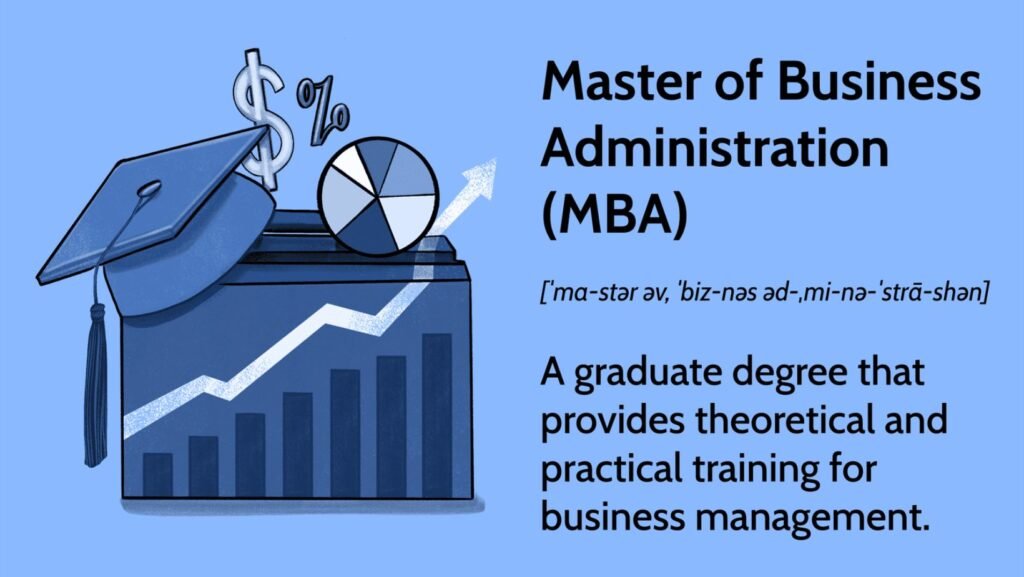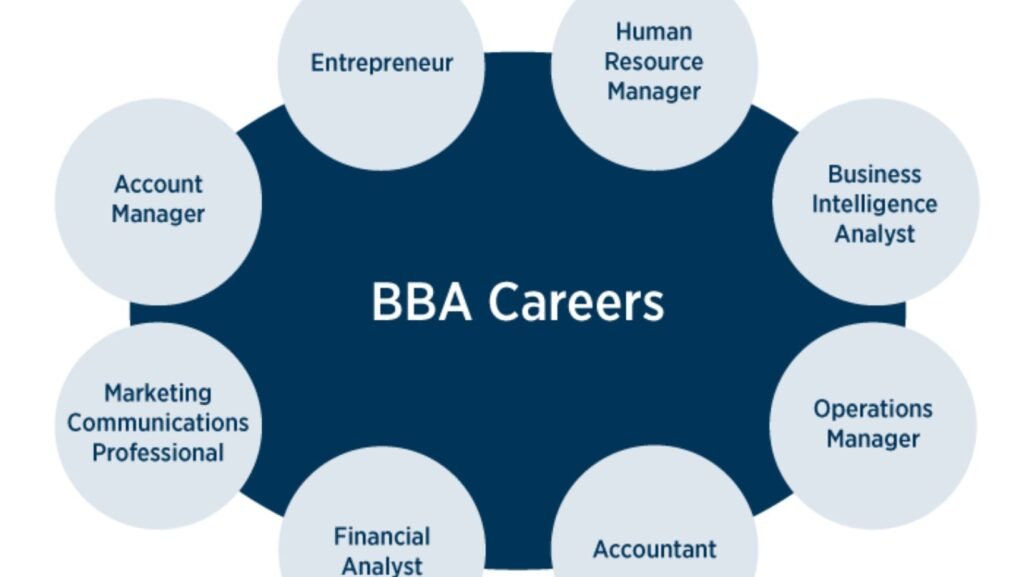Table of Contents
- What is a Business Administration Degree?
- Why Choose a Business Administration Degree?
- Career Opportunities with a Business Administration Degree
- Salary Expectations for Business Administration Graduates
- Types of Business Administration Degrees
- Top Skills Gained from a Business Administration Degree
- Business Administration Degree vs. Other Business Degrees
- Online vs. Traditional Business Administration Programs
- How Long Does it Take to Get a Business Administration Degree?
- Cost of a Business Administration Degree
- Business Administration Degree FAQs
Introduction
One of the most flexible and sought-after degrees in higher education, a Business Administration degree gives students the knowledge and abilities to succeed in many fields. It covers important fields such as management, finance, marketing, and operations, thereby arming graduates for positions in public and commercial leadership. A Business Administration degree can open many possibilities and pay well as demand for corporate workers rises. We shall go over the specifics of a Business Administration degree, its advantages, job paths, and more in this article.
Key Takeaways
- A Business Administration degree equips students with essential skills in management, finance, marketing, and entrepreneurship.
- The degree opens doors to diverse career paths, including management, human resources, and finance, with high earning potential.
- Business Administration graduates see an average starting salary of $55,000, with mid-career professionals earning $80,000 to $120,000 annually.
- The Bureau of Labor Statistics projects a 7% job growth in business and financial occupations from 2021 to 2031.
- Flexible learning options, such as online programs and part-time degrees, cater to working professionals and students with busy schedules.
- Business Administration degrees offer specializations, allowing students to focus on areas like marketing, finance, or supply chain management.
A business administration degree is what?

An academic program emphasizing educating students on how to run and manage companies successfully is called Business Administration. It addresses everything from operations to human resources to finance, accounting, marketing, and operations. Business Administration graduates equip theoretical knowledge and practical abilities to address challenging business problems and guide teams toward success.
Most Business Administration courses let students advance at their speed by providing graduate ( Master’s and MBA) and undergraduate ( Bachelor’s) choices. Programs can feature capstone projects and internships offering practical field experience.
Why Would One Want a Business Administration Degree?

Those who wish a thorough knowledge of how companies run would be well suited for a degree in business administration. These are the main factors guiding your decision on this degree:
Graduates in business administration can find jobs in government, retail, healthcare, and finance among other sectors.
- High Earning Potential: The National Association of Colleges and Employers (NACE) estimates that graduates in business administration typically start their careers at about $55,000 annually.
- The U.S. Bureau: The Labor Statistics (BLS) projects that between 2021 and 2031 employment in business and financial operations would rise by 7%.
- The degree: Emphasizes developing management and leadership abilities, which are vital for professional development.
- Many programs: Provide part-time or online choices so students can juggle jobs, life, and studies.
Jobs Using a Business Administration Degree

Those who graduate with a degree in administration have several different job possibilities. The following are some of the most often pursued professional routes:
Although these positions call for various skill sets, a in helps graduates to manage the rigors of each by combining theoretical knowledge with practical experience. Many of these positions also provide chances for development, thereby increasing earning capacity.
| Career Path | Average Salary (per year) | Projected Job Growth (2021-2031) |
|---|---|---|
| General Manager | $104,240 | 8% |
| Financial Analyst | $81,410 | 9% |
| Marketing Manager | $135,030 | 10% |
| Human Resources Manager | $126,230 | 7% |
| Management Consultant | $93,000 | 11% |
Business Administration Salary Anticipations Former students
Graduates in business administration find competitive pay in many different sectors. While mid-career salaries vary depending on the position, sector, and geographic area, entry-level professionals can expect to make roughly $55,000 yearly. The following table offers information on earning possibilities during several phases of life:
| Career Stage | Average Salary |
|---|---|
| Entry-level | $55,000 |
| Mid-career | $80,000-$120,000 |
| Senior management (10+ years) | $150,000+ |
Factors including the particular industry, region, and degree of education can greatly affect salary ranges. Professionals in financial services or technology, for instance, usually demand more than those in non-profit or educational sectors.
Degrees in Business Administration

There are various degrees in business administration, each suited for a different academic and professional aim:
Associate’s degree in business administration
Usually lasting two years, an associate degree offers basic expertise in business principles. Program graduates can seek entry-level employment or credit transfer to a bachelor’s degree.
Bachelor of Business Administration in Management
The most often used degree among business professionals is a bachelor’s degree. This four-year curriculum provides in-depth study spanning several business areas, including operations, marketing, and finance.
MBA, Master’s in Business Administration
Comprising advanced corporate management and leadership skills, the MBA is a graduate-level degree. It is meant for those in the professional ranks looking for senior management positions.
Business Administration Doctorate (DBA)
Stressing research and advanced business theory, the DBA is the highest academic degree in business. Usually, professionals hoping for academic or consultancy jobs pursue it.
Main Skills Acquired with a Degree in Business Administration

Enrolled in a Business Administration program, students pick up a range of highly sought-after abilities by companies. Among the leading abilities are:
- Management and Leadership: Capacity to run groups of people and properly allocate resources.
- Understanding financial: Statements, budgeting, and financial analysis helps one be financially literate.
- Strategic thinking: The capacity to create long-term plans meant to support companies’ expansion and success.
- Presenting ideas: Clearly and convincingly requires excellent written and spoken communication abilities.
- Finding original: Answers and spotting corporate issues calls for creativity.
- These competencies: Are relevant in many different sectors, so Business Administration graduates are quite flexible in the employment market.
Degree in Business Administration Unlike Other Business degrees

Many times, business administration is equated with other degrees in business, such as marketing, accounting, and finance. Although these degrees highlight particular aspects, they provide a more all-encompassing education across many disciplines. For students who wish to retain their job choices open, this makes it perfect.
- Business Administration: Emphasize management, leadership, and business concepts generally.
- Emphasize corporate: Finance, investments, and financial markets in particular.
- Focus on accounting: On tax preparation, auditing, and financial reporting.
- Marketing: Give advertising, market research, and brand management a top priority.
- Although every: One of these degrees has advantages, Business Administration gives the freedom to follow several professional routes.
Traditional Business Administration Programs vs. Online Ones

Nowadays, several colleges grant degrees in business administration online, therefore enabling students to finish their courses from anywhere. Working professionals would find online classes perfect since they give flexibility. Still, conventional on-campus programs offer more chances for in-person networking and access to university resources.
One advantage of online courses is flexibility in terms of studying on your calendar.
Availability of a large spectrum of events independent of location.
Usually more reasonably priced than conventional courses.
Drawbacks of Conventional Programs:
Personal networking events including classmates and teachers.
Access to university buildings including career centers and libraries.
A structured learning atmosphere may be more appropriate for some students.
Employers value both online and conventional programs; so, the decision relies on personal tastes and situations in life.
| Degree Level | Typical Duration |
|---|---|
| Associate Degree | 2 years |
| Bachelor’s Degree | 4 years |
| MBA (Full-time) | 1-2 years |
| MBA (Part-time or Executive MBA) | 2-4 years |
| Doctorate (DBA) | 3-5 years |
How Long Does One Need to Get Their Business Administration Degree?

The degree of the program determines the time needed to finish a
While part-time programs give more flexibility for working people, accelerated programs and online choices could let students finish their degrees more rapidly Cost
Factors including the institution, region, and program level might affect the cost of a The following table offers a general picture of normal tuition rates for several degrees:
| Degree Level | Average Annual Tuition (USD) |
|---|---|
| Associate Degree | $3,570 (Public) |
| Bachelor’s Degree | $9,349 (In-state, Public) |
| MBA (Full-time) | $40,000 – $60,000 |
| Online MBA | $15,000 – $30,000 |
Programs like employer tuition assistance, grants, and scholarships serve to lower the general cost of
Frequencies of Business Administration Degree Questions

With a degree in business administration, what employment possibilities exist?
Graduates can go into management, marketing, finance, HR, and more. Common positions are general manager, management consultant, marketing manager, and financial analyst.
A graduate of business administration makes what?
With mid-career pay ranging from $80,000 to $120,000 annually, entry-level grads may expect to make about $55,000 a year.
Worth it is a degree in business administration?
Indeed, a degree in business administration provides flexibility, great earning power, and significant employment possibilities in many different sectors.
With a degree in Business Administration, which are the greatest specializations?
Among popular specialties are supply chain management, marketing, finance, and human resources.
A Business Administration degree takes what length of time?
A bachelor’s degree usually takes four years, while for full-time students an MBA can take one to two years.
Can I work on a Business Administration degree online?
Indeed, several colleges grant degrees in Business Administration online, giving working professionals freedom.
Conclusion
In conclusion, earning a Business Administration degree opens doors to various career opportunities across various industries. This versatile degree equips graduates with essential skills in management, finance, marketing, and leadership, providing a strong foundation for success in the corporate world. Whether you’re aiming to start your own, pursue a leadership role, or advance in your current career, a offers the knowledge and tools needed to thrive in today’s competitive environment.

